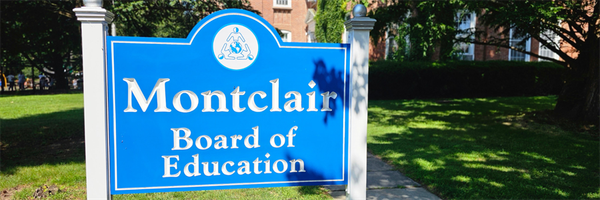Burrow - Making Everyone Comfortable but the Competition
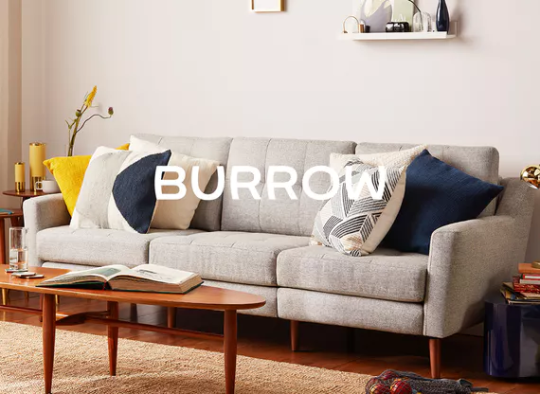
“Does anyone know what JAND is?” Stephen Kuhl and Kabeer Chopra were in Ethan Mollick’s entrepreneurship class at Wharton in 2016 and had no idea what JAND was or what could possibly be contained in the powerpoint professor Mollick was waving in front of the class. It happened to be the initial pitch for Warby Parker, a leader among direct-to-consumer brands – something they would come to know quite a lot about, soon enough. Stephen and Kabeer’s class project would snowball into a ride through Ycombinator and on to become the rapidly emerging direct-to -consumer sofa business – Burrow.
Sofas are a huge pain. If you want something fast, it’s going to be cheap and flimsy, and you’re going to spend the weekend with an allen wrench, wood dowels, and an instruction manual that may as well be in Swedish. If you want something nice, it’s going to take forever to ship, let alone the difficulty of getting it through the door, in the room, and settled on the floor.
It was no different for founders Stephen and Kabeer. Kabeer went to West Elm and found a sofa he liked for twelve-hundred dollars, but it would take twelve weeks to arrive. If he picked something that was in stock, they could deliver it for two-hundred and fifty dollars in two weeks. Fortunately, he lived next door, so he went back to his apartment, retrieved a dolly and wheeled it back himself. Meanwhile, Stephen spent six-hundred dollars and the greater part of the weekend learning Swedish.
Burrow was born out of Stephen and Kabeer’s frustration with exactly these problems. No one sold a sofa that was comfortable, stylish, easily shipped, high-quality, and available, quickly. The market, as they saw it, was broken.
The founders went to Ycombinator the summer of 2016 and started taking preorders. They developed a novel, modular design that incorporated premium materials and finishes but wouldn’t require an expensive logistics and trucking system to get a monolithic sofa to the curb, up the stairs and to the floor. The design would culminate in a sofa that achieved the same quality standards as Crate & Barrel, but could be shipped in pieces that could be assembled quickly and intuitively. By the second half of 2016, they had more than one thousand preorders. It turns out, the customer shared their frustrations.
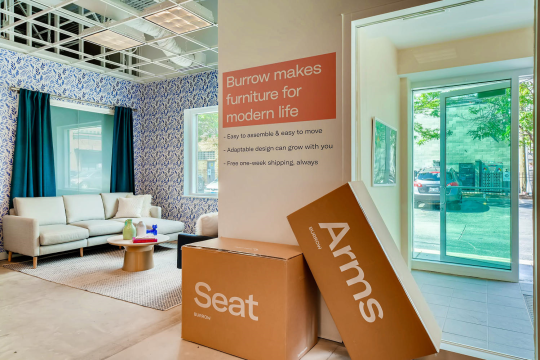
But there was a problem. No one wanted to work with them. Stephen and Kabeer wanted to make sofas, merchandise them online, and ship them in a week. There were more than one-thousand people who agreed with them, and they were expecting their sofas by October 2016. The big manufacturers in North Carolina and throughout the South practically laughed them out of the room. They were built for large volumes, long lead times, and traditional designs. The prospect of retooling a manufacturing line to accommodate a thousand orders seemed more like a favor than a business proposition. By some fluke, they had a Wharton connection whose family friend owned a manufacturer in Mexico.
Delays meant Burrow wouldn’t be able to meet their fall delivery deadline. They couldn’t deliver until December, at the earliest. It was bad news, and Stephen and Kabeer were worried they would disappoint their customers, so they decided to reach out to them. They called and emailed everyone who had preordered the sofas, so they could explain the situation. Thinking it was just some big, faceless manufacturer, they were surprised to speak with Stephen or hear from Kabeer and learn that it was just the two of them at the helm, raising the sails, cleaning the decks, and steering the ship. Some took their money back; others were grateful for the consideration and encouraged them to sail on.
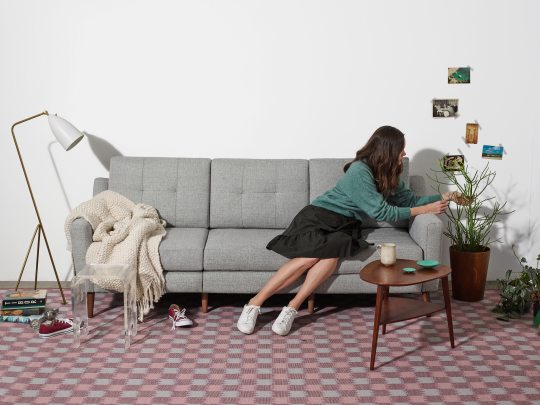
And they were sailing with a strong tail-wind. Millennials account for over forty-percent of all furniture spending. They expect fast and free shipping and online shopping. One-third of people in their twenties move every year, according to Burrow’s research. Online furniture shopping is only 15% of the $111b furniture industry, but it’s growing at 20% a year. Demand for Burrow wasn’t a fluke. It was exactly where the market was heading.
By April 2017 Burrow was delivering sofas within a week. They rapidly outgrew the Mexican manufacturing partner in mid-2017. It was time to go back to the manufacturers who had rejected them before. Stephen set out for a few weeks on the road with the Mississippi Development Authority. It turns out that the legacy of the Russian immigrant, Morris Futorian, had set the stage for a strong, sophisticated furniture manufacturing base in Mississippi, and the Development Authority was more than happy to share it with Stephen.
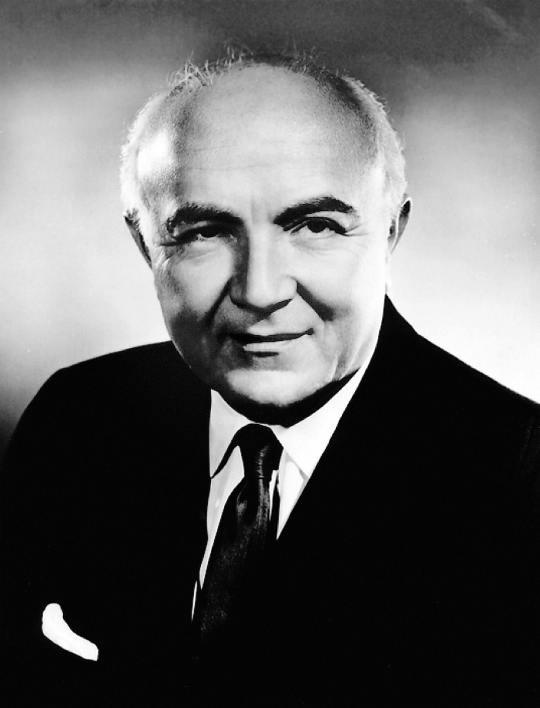
The so-called University of Futorian comprised the many generations of entrepreneurs and craftsmen who emerged from Futorian’s workshops and factory in New Albany, Mississippi. Morris Futorian moved from Chicago in September 1948 with a vision to reinvent furniture manufacturing –an industry dominated by individual craftsmen– along the lines of Ford-style assembly-line manufacturing. He named the factory the Futorian - Stratford Furniture Company, after the street he lived on in Chicago and trained members of the depressed local farm community to fill out the lines. The efficiencies he introduced to furniture manufacturing would lead to high quality output with faster production and lower prices – it was fitting that Burrow’s innovations would find their way to production through Futorian’s legacy.
Burrow moved manufacturing to Mississippi in the summer of 2017. Stephen had found a facility in Tupelo that had been recently acquired by a former corporate executive at Target. The husband and wife team were eager to take on the flourishing brand and put their factory to work. It was exactly what Burrow needed, but it wouldn’t be their last manufacturing partner. As luck would have it, growth continued to spike, and they rapidly outstripped the capacity of the Tupelo facility. Indeed, customer demand grew so quickly that the Burrow team had to step in and lend a hand with manufacturing operations to ensure the consistent production of an escalating number of sofas.
When Burrow shifted manufacturing again, this time to North Carolina, they were met with a much warmer welcome. Manufacturers were starting to understand the power and the scale Burrow, it’s ecommerce-driven model, and the innovative, modular construction brought to the furniture industry.
Wayfair goes to manufacturers, asks what they’re making, and puts it in their marketplace. Article goes to manufacturers, asks what they’re making and puts their brand on it. Burrow turned furniture sales on its head. Stephen and Kabeer went to manufacturers with a design and a juggernaut of demand. They focused on simplicity of construction, speed of manufacture, ease of shipping, and the ability to put a high-quality sofa in the living room of every one of their customers within a week.
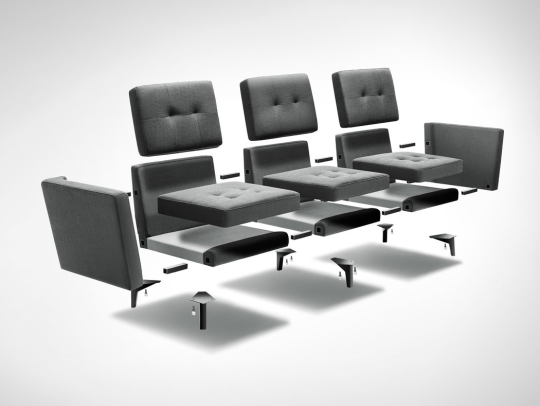
The Burrow sofa materials and quality are on par with a premium brand. The cost of goods is essentially equivalent, but traditional brands have to ship a fully assembled sofa to a distribution center and then, once again, to the customer, through a specialized trucking company. Many of these costs are bundled into the sticker price. Burrow’s patented modular assembly and locking mechanism means they can just ship it via UPS – a much faster, cheaper option. Burrow can sell an equivalent or better quality product $500-700 cheaper than Crate & Barrel. Moreover, because of the efficiencies entailed by the Burrow design, they can build and deliver faster, so they also have negative working capital.
Behind the sofa, however, stands the team and the culture that Stephen has developed. Seasoned, strong candidates from big, successful brands are drawn to Burrow. The team includes the former SVP of Marketing from Design Within Reach, the former SVP of Product Design for Fab, and Creative Lead from B-Reel.
Burrow closed 2018 with twenty-nine employees and having booked five times their first-year revenue of 2017. In the first two years, they booked more than $20m in revenue for just one style of sofa. They have already introduced ottomans and chaises, and they recently launched leather and corner-sectional sofa sofas. Pillows and throws have become a key add-on item for their customer community, and these will be followed by tables and rugs. Their market-success has also led to a growing list of accolades and awards: the Time Magazine 50 Best Inventions of 2018; the Fast Company 10 Most Innovative Retail Brands in the World; the 2018 Good Design Award; among others. Burrow now competes with the strongest brands in the world.
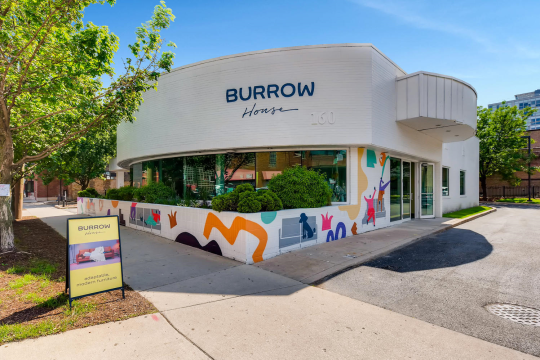
It’s been a remarkable rise for Burrow through Stephen’s leadership. He continues to attract the most prestigious job candidates and has now reached thirty-seven employees, with an additional ten part-timers at their first retail showroom, Burrow House, in Soho. The core business continues its strong growth and has benefited from the expansion of product categories, distribution channels, and new markets. The successful launch of Burrow house in NYC brought in-store retail into the fold, but it also led to a doubling in online ecommerce conversions in New York. Expect new stores in Chicago and Washington DC soon. Even now, Stephen and the team reach out to every customer after a year, just to see how they like the sofas. No one expects it. Everyone loves it. Thanks to Burrow, we’re not stuck with long lead-times and indecipherable instructions any time we consider a sofa.

